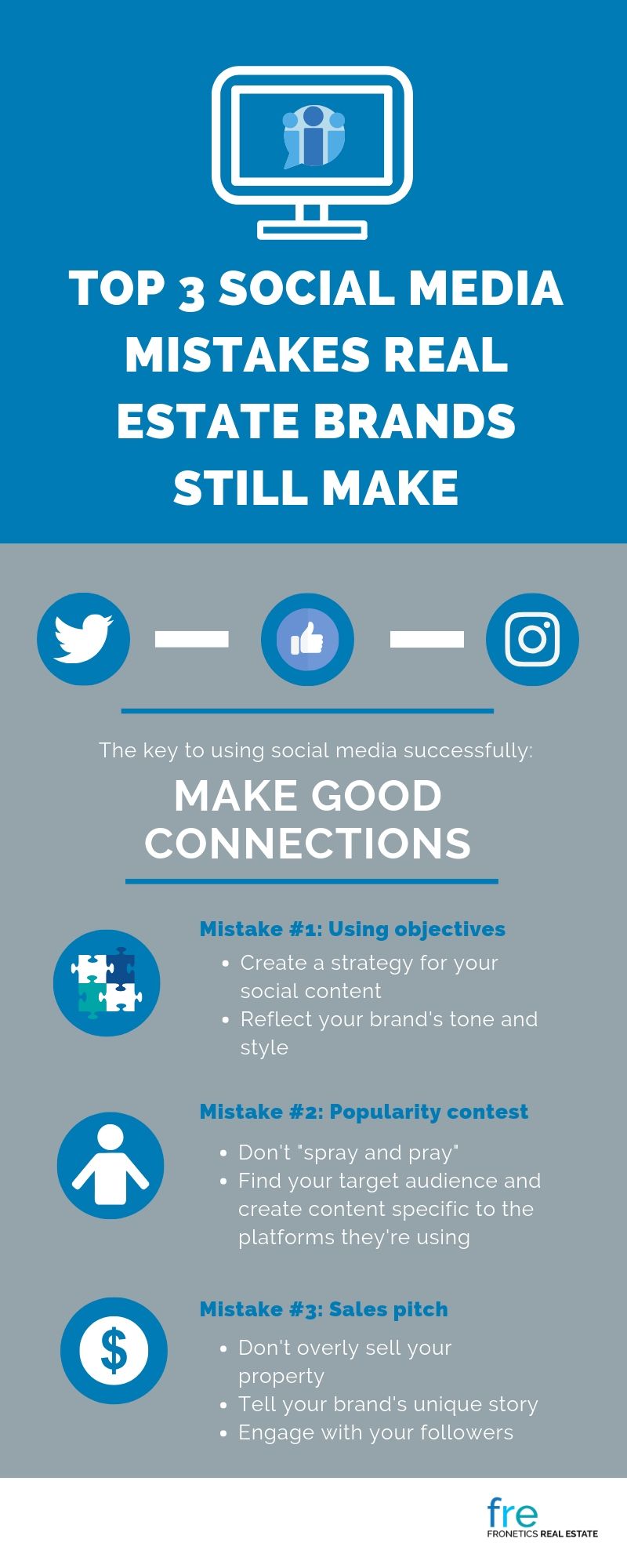Your search results for "Instagram"

Top 6 Effective Digital Marketing Strategies For 2019
As a real estate marketer, you want to be at a competitive advantage. To sell properties faster, here are six digital marketing strategies to get your properties in front of your competitors.
When it comes to real estate marketing, the same concepts apply. Everybody wants to know what the competition is doing differently. To drive sales, you have to look at your performance and make changes where necessary.
The trick is to look at key performance indicators (KPIs) such as website traffic, conversion rate, market share growth, purchaser rate, and social media engagement as benchmarks to measure your progress. But there is more to real estate digital marketing than just looking at your website traffic.
Here are six of the top digital approaches that work for real estate.
1. Optimize your website
As of July 2019, there are 4.33 billion active internet users, most of whom come from the United States. This means almost everyone, including those searching for luxury developments, is using the internet to do research and find properties to purchase. Therefore, the importance of having a professional website cannot be emphasized enough. In fact, many luxury real estate firms are using digital media to show their properties online.
Recent data from the National Association of Realtors backs this up:
- 90% of real estate firms have websites to show their property listings.
- Over 50% of home buyers looked online for properties in 2018
With the traditional real estate market increasing its online presence, optimizing your website is crucial to get ahead of the competition and reach more potential buyers. The result? More sales.
2. Be easy to reach
With a professional and well-optimized website, users will want to reach you. Make sure you include all your contacts on social media pages, website, and emails. Your contact information should remain consistent whether it’s on a business card or social media accounts — you’d be surprised how often this is not the case!
3. Have a video marketing campaign
Of all the digital formats, videos have the highest engagement rate, making video marketing one of the most effective digital marketing strategies to showcase your services, increase brand awareness, and lower cost per lead.
Videos on Twitter get an average of more than six retweets, while Facebook users view 100 million hours of video content daily. Video content can drive organic search traffic by 157%.
4. Start blogging
Do you want more prospective visitors to your website? Then start a blog or breathe new life into that dormant one on your site. A business blog is an essential and inexpensive marketing tool for driving traffic to your web pages and improving search engine ranking.
However, did you know only 44% of people update their blogs, yet there are over 329 million monthly readers? So, while other companies are relying on traditional marketing strategies, you can capitalize on this competitive advantage and use a blog to provide value to customers and build trust.
5. Use social media as part of your digital marketing strategy
You need to be where your prospects are. That means you need to build a strong presence on social media platforms like LinkedIn, Twitter, Facebook, Instagram, WhatsApp, and many others. The easiest way to promote your brand is to through your social media account. According to Forbes, having a LinkedIn company page increases brand awareness and helps to promote your services to potential clients. With over 500 million users, LinkedIn is also the most effective social media platform for securing professional audience engagement. You can also use all the other social media accounts to communicate with your followers and boost your online presence directly.
6. Optimize for local SEO
Even after optimizing your website to reach a broad audience, you should also focus on local traffic. A targeted approach allows those looking for properties nearby — let’s say in Boston or surrounding areas — to get the luxury development listings that match their needs and goals. Use Google Analytics to find out if locals are visiting your site and add your company to local directories. Other ways to optimize for local SEO is to use a local number, encourage customers to leave reviews, and having geo-targeted content.
As of 2019, there are more options to market real estate business than ever. Whichever digital marketing strategy you prefer, you should be branching out and using the most effective ones for your business. Remember, your real estate digital marketing goals should be tailored to maximize your visibility online, bring in new businesses, and keep you ahead of the competition.
Related posts:
- Real Estate Marketing Leads: 4 Myths (and How to Disprove Them)
- DIY Digital Marketing Strategy for Real Estate in Four Easy Steps
- Developing Your Real Estate Brand with Video Marketing
Your search results for "Instagram"

Top Real Estate Marketing Trends 2019
It’s the start of a new year, and that means savvy marketers are looking to stay ahead of the curve. These top real estate marketing trends are what we see coming for 2019.
Real estate is a competitive and ever-changing industry. Just when your business settles into a successful routine, new marketing tactics and trends can throw you a curve ball. But being aware of the forces shaping the industry is the best way to hit your marketing efforts out of the park this new year. Here are the four top real estate marketing trends that we see coming in 2019.
1) It’s all about the video
If you’re a frequent reader of our blog, you’ll know that we’ve been writing about the astronomical rise of video in real estate marketing for a while now. We can’t stress it enough: video is here to stay, and it’s time your business starts embracing it as a highly effective content marketing tool.
Part of what makes video such an appealing form of content is its inherent shareability, which drives organic traffic. Getting your content and properties out to your base audience is one thing but empowering that audience to be your ambassadors is a huge next step. Creating appealing, engaging video is an ideal way to give your target audience material to share with their networks—with the potential to expand your reach exponentially.
2) People are craving authenticity
One of the dangers of a strong marketing presence is that it can almost become too smart and slick for its own good. It’s no surprise that, as Instagram edges us all towards posting only carefully curated, perfectly doctored reality, companies are likewise looking to share nothing but perfection.
But increasingly, social media users are craving authenticity. Of course, this doesn’t mean creating and sharing sloppy content, but it does mean allowing your followers to get a real, honest sense of your company and properties through the content you post on social media. Let your social media platforms be places where you engage your followers through compelling content that says something about the culture of your business and your passion for real estate.
3) Keep it personal
In a world of bots, robocalls, and AI, don’t underestimate the power of the personal. Much as users are seeking authenticity from marketers on social media, your potential buyers and renters will respond all the better to personalized content and relationship-building.
Whenever you can, add a personal touch to your communication with your audience. This doesn’t just mean adding their names to emails—in fact, marketing automation can (perhaps paradoxically) be your secret weapon when it comes to developing personal communication with potential buyers and renters. (Check our guide to marketing automation tools for real estate marketers here.)
4) Get creative
Writing and talking about creativity is a bit of a paradox. As soon as trends start to catch on and become, well—trends, they’re no longer shiny new innovations. One thing we can say for certain about the new year, and the future of real estate marketing going forward, is that creativity is going to be key.
While we can’t tell you exactly how to be creative, we can give you tips for developing an environment in which creativity can thrive. Being aware of trends, benchmarking your marketing efforts against those of your competitors, reading industry blogs, and listening to your client-base are just a few key ways to foster a culture of marketing creativity.
Related posts:
- 4 Real Estate Marketing Trends 2018
- Infographic: Real Estate Marketing Trends 2018
- 10 Social Media Statistics for Real Estate Marketers 2018
Your search results for "Instagram"

Infographic: Top 3 Social Media Mistakes Real Estate Brands Still Make
Social media is a valuable tool for real estate brands, but only if they use it to their best advantage and avoid these three common mistakes.
Highlights:
- Social media is one of the most effective ways to increase brand awareness and generate leads.
- All social media channels have a differentiating quality that makes them appealing to specific audiences. Don’t try to tackle every platform, focus on where your target audience is spending time.
- Real estate brands that succeed on social media are finding innovative and creative ways to engage and connect with their users.
91% of real estate professionals use social media. And we all understand why. By 2019, it is estimated that there will be around 2.77 billion social media users around the globe. That’s a lot of potential customers.
So it’s easy to understand why real estate brands are using social channels to boost their marketing efforts. Social media is an easy and effective way to increase your properties visibility and reach new audiences, but only if you use it correctly.
Top three social media mistakes real estate brands make
Mistake #1: Using objectives
Marketers need to use strategy to effectively utilize social channels. With the constant updates and changes to social platforms, real estate brands need to plan out content, frequency of posts, and pillar topics. Instead of posting with objectives in mind — like increasing leads — try to create posts that reflect your brand, follow your style guidelines, and reflect your brand’s tone.
A clear strategy can also help improve ROI. Almost two-thirds of marketers still struggle to prove their marketing efforts on social platforms are working. With a defined social media strategy, you can create specific goals, track and measure your efforts, and make changes when needed.
Mistake #2: Popularity contest
It’s easy to think that posting on all the most popular social channels is the best idea. Think again. Social media platforms have specific qualities that make them popular among audiences. Real estate marketers need to identify their target audience and find out what social channels they are using.
The next step is to create content that aligns with those platforms. As marketers, we know how easy it is to post the same content across all platforms. The success behind social media is authenticity and engagement, so it’s important your posts reflect this. Create content, like video, that caters to social channels to help build brand awareness and loyalty.
Mistake #3: Sales pitch
Being overly “salesy” will make prospects run – maybe right into your competition. The best way to win buyers on social media is through engagement. Content that helps prospective buyers envision themselves in your property is what will increase your organic reach. Create innovative and informative content that stands out on social channels by telling your brand’s story. This unique perspective will help create an emotional connection will have a long-lasting impact on viewers and drive brand loyalty.
Related posts:
- 5 Creative Ways to Use Instagram Stories for your Luxury Real Estate Brand
- Measure Social Media Success in Terms of Potential, not Dollar Amount
- How to Use Social Media Hashtags in Real Estate Marketing
Your search results for "Instagram"

5 Tips to Step Up Your Real Estate Social Media Marketing
Real estate marketers are increasingly turning to social media as a strategic tool to grow brand awareness, gain market intelligence, and generate organic traffic. Here are five tips to boost your real estate social media marketing efforts.
If you’re a real estate marketer, it’s probably old news that the vast majority of the real estate market has moved online. Increasingly, traditional marketing tactics are giving way to newer methods, and inbound marketing is taking the place of outbound. We’ve said it before and we’ll say it again: real estate and social media are a match made in heaven.
You should be making the most of this incredible tool for marketing luxury and commercial real estate. Here are our top 5 tips to grow your real estate social media marketing in 2019.
1. Be authentic
Social media for real estate marketing is all about the personal. Users on these platforms are looking to connect with the real people behind the brands they follow. Increasingly, social media users are craving authenticity. Part of building your brand is about discovering and cultivating your “corporate personality,” particularly when it comes to social media. Find your brand’s voice, and let it shine through.
2. Use hashtags strategically
Using hashtags well can help increase your properties’ visibility, as well as growing organic reach on Twitter, Facebook, and Instagram. Using hashtags in your social media content lets you categorize your content, draw attention quickly and easily, drive conversations, increase visibility, and harness the power of topics on social media. Check out our guide for using hashtags in real estate marketing here.
3. Make use of the right tools
With demand comes supply, and as social media marketing has become more and more important, developers have created some extremely helpful tools to help you streamline your efforts. Whether it’s free stock photos, tools that help you create infographics, or automating your social media posts, there’s likely a tool that will help you get the job done more quickly and easily.
4. Diversify across platforms
While Facebook still reigns supreme in the social media universe, if you aren’t connecting with users on other platforms, you’re missing out on huge opportunities. While each platform requires its own content and posting strategy, you’re essentially presenting your brand identity from the various angles allowed by different platforms. Not only that, using multiple social media platforms helps improve your search engine rankings.
5. Engage with your followers
It may seem painfully obvious, but too many real estate marketers forget that social media is just that: social. When followers engage with your posts, always reply! Encourage comments and shares—and join the conversation. Not only is it a great way to cultivate a loyal following, but you can also gain valuable insights into your audience’s preferences.
As with any marketing endeavor, a crucial first step for social media marketing is strategy. We’ll leave you with this idea—your real estate social media marketing will benefit immeasurably from a clear, documented strategy, with measurable goals and a mechanism for collecting and analyzing data. Used wisely, social media can help build your brand, engage your potential buyers and renters, generate leads, and establish your reputation as a trusted resource.
Related posts:
- Social Media Can Be a Strategic Weapon in Real Estate Marketing
- 10 Social Media Statistics for Real Estate Marketers 2018
- Top 10 Social Media Posts 2018
Your search results for "Instagram"

4 Real Estate Marketing Trends 2018
These 4 takeaways from Placester’s 2018 Real Estate Marketing Survey give us an idea of real estate marketing trends to keep an eye on.
Digital marketing platform Placester recently published the results of its 2018 Real Estate Marketing Survey. The survey, which collected data from hundreds of real estate professionals nationwide, contains valuable information for benchmarking your marketing efforts in “an industry ready to invest more time, money, and energy toward online marketing and generating more leads.”
We’ve pulled out the top 4 takeaways from the survey here. Interestingly, these real estate marketing trends align with those we are seeing with our clients as well.
In general, real estate marketers are focused on leads: acquiring valid potential buyers and then turning them into sales. It makes sense, then, that many are turning to content marketing as a strategy, as it can be a highly effective lead-generation engine. Read on for more.
4 real estate marketing trends to watch
1) A focus on lead generation, nurturing, and conversion.
You can learn a lot from looking at the aggregate goals for the industry.
When asked about their top objective for 2018, 40.3% of survey respondents name generating more new leads than in 2017. Additionally, 23% look to improve on last year’s client conversion rate, 21.8% cited focus on the quality of leads earned, and 14.9% are aiming to learn how to better nurture and qualify prospects.
The bottom line: real estate professionals are focusing on generating, nurturing, and converting leads.
2) Challenges
As with looking at objectives, having an understanding of industry-wide challenges also offers valuable insight.
46.4% of survey respondents said that generating enough high-quality leads is the biggest marketing challenge they face in 2018. Rounding out the list, 24.9% are concerned about finding the right marketing tools to use; 23.4% cite converting leads into new business; and 5.3% are worried about analyzing their marketing performance.
Just as lead generation is a top priority for the majority of respondents, it’s also the top concern for real estate professionals.
3) Video
One of the most popular marketing tactics for greater exposure in 2018 is video.
When asked what part video will play in overall marketing strategy, 49.5% of respondents indicated that it would be a focal point. 43.7% said they would use it some of the time, while only 6.8% indicated that video didn’t interest them at all.
The real estate industry is embracing the power of video marketing. And the good news is, you don’t need expensive camera, lighting, or a production studio — your smartphone can be just as effective for creating video content for your social media outlets.
4) Social media
Which brings us to social media.
When asked which social media network they will use most, a whopping 84.6% of respondents pointed to Facebook, with 11.9% saying Instagram, 1.6% saying Twitter, and 1% respectively for Pinterest and Snapchat.
Facebook is ideal for real estate marketing in many ways. Its large user base makes it a go-to network, as well as its robust mobile presence, with location-specific advertising and sophisticated algorithms to help you reach your target audience.
What real estate marketing trends are you keeping an eye on this year?
Related posts:






